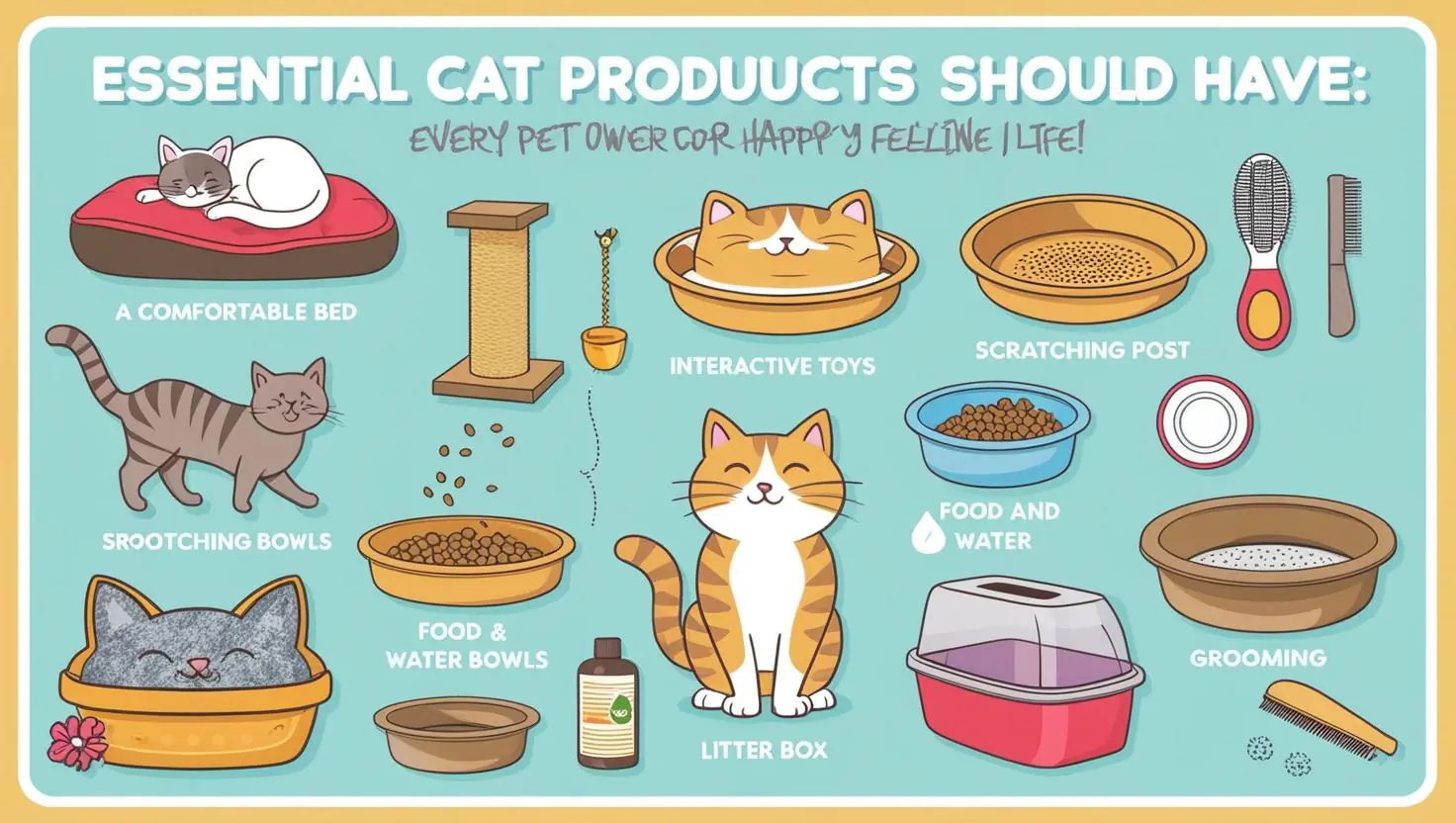Top Bird Care Tips for Happy, Healthy Feathered Friends: Your Complete 2025 Guide
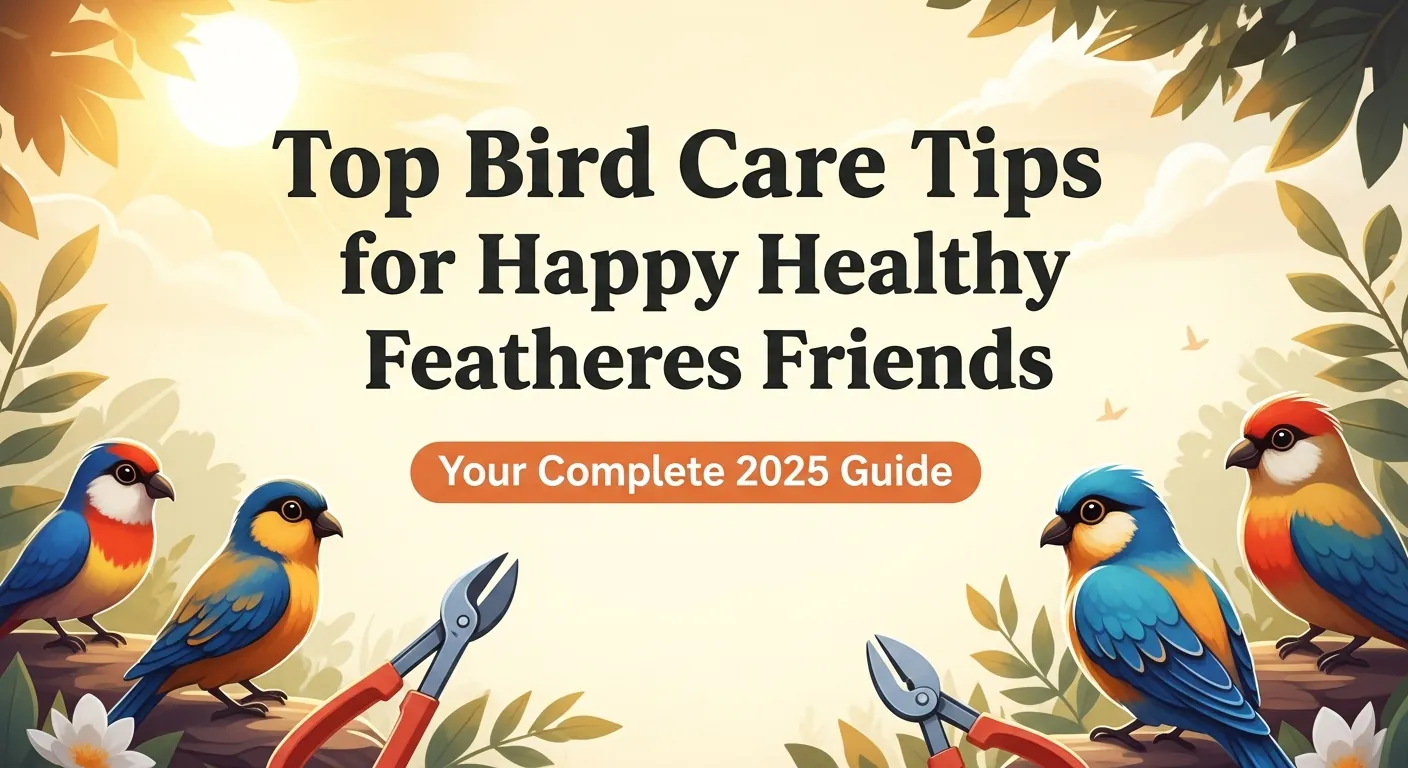
Before diving into specific care tips, it’s crucial to understand that birds are complex creatures with unique needs. Unlike cats or dogs, birds have evolved as prey animals, making them naturally cautious and requiring special attention to their emotional well-being. Each species has distinct requirements, but certain fundamental principles apply to all pet birds.
Birds are highly intelligent animals that form strong bonds with their human companions. They require mental stimulation, social interaction, and a carefully controlled environment to maintain optimal health. Understanding these basic needs is the first step toward providing exceptional care for your feathered friend.
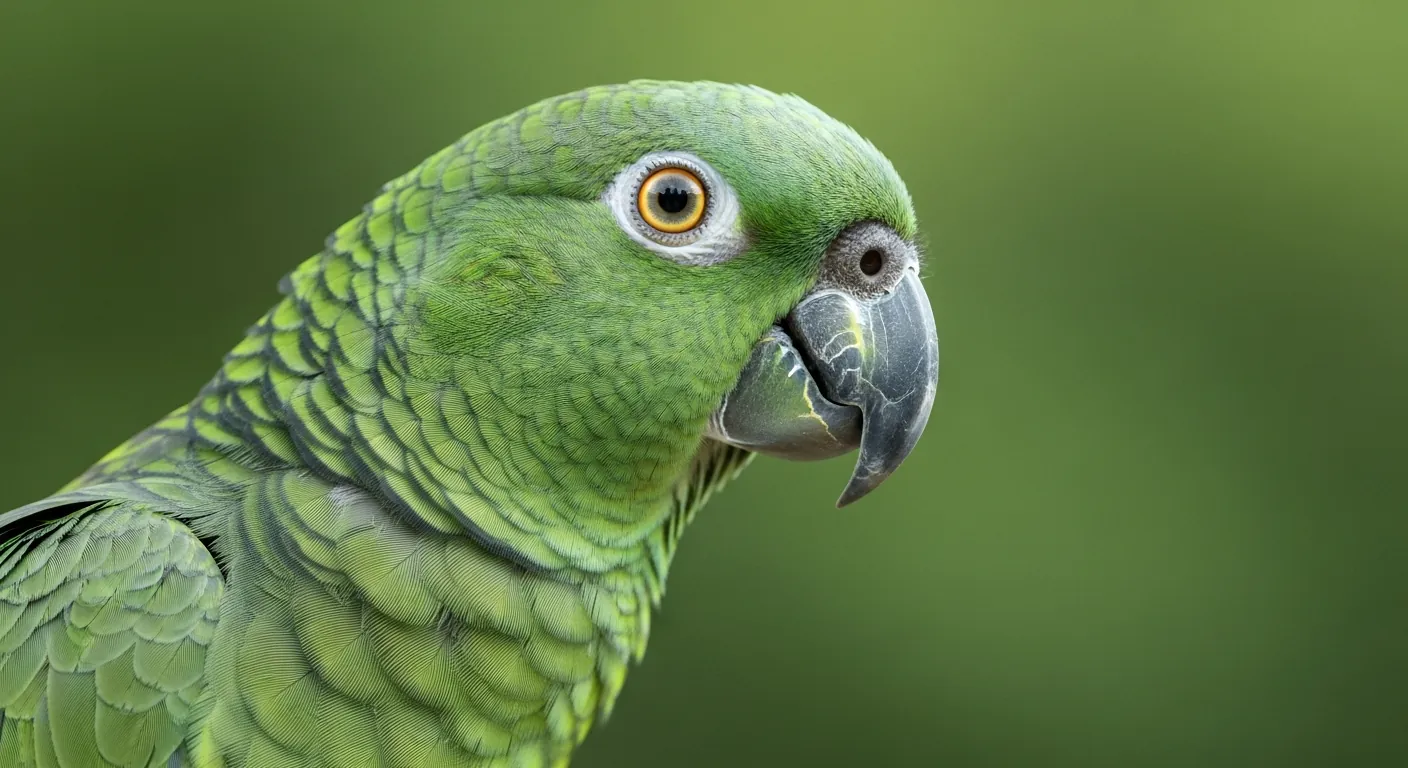
Essential Bird Nutrition: The Key to Vibrant Health
Creating a Balanced Diet Foundation
Proper nutrition is fundamental to bird health, with studies showing that 80-90% of bird diseases are related to inadequate diet. The days of feeding birds a seed-only diet are long gone. Modern avian nutrition emphasizes variety, balance, and species-specific requirements.
The Modern Bird Diet Should Include:
- High-quality pellets (60-70% of diet): Choose species-appropriate, fortified pellets as the foundation
- Fresh vegetables (20-25% of diet): Dark leafy greens, carrots, broccoli, and bell peppers
- Healthy fruits (5-10% of diet): Berries, apples, and tropical fruits in moderation
- Seeds and nuts (5-10% of diet): As treats, not the primary food source
- Occasional healthy grains: Quinoa, brown rice, and whole wheat pasta
Daily Feeding Guidelines
Establishing a consistent feeding routine is essential for your bird’s health and happiness. Keep your bird’s bowl about three-quarters full of fresh food throughout the day, as birds prefer to pick at their meals. Remove any uneaten fresh foods within 2-4 hours to prevent spoilage and bacterial growth.
Pro Tip: Introduce new foods gradually and at the same time each day. Birds can be neophobic (afraid of new things), so patience is key when expanding their diet.
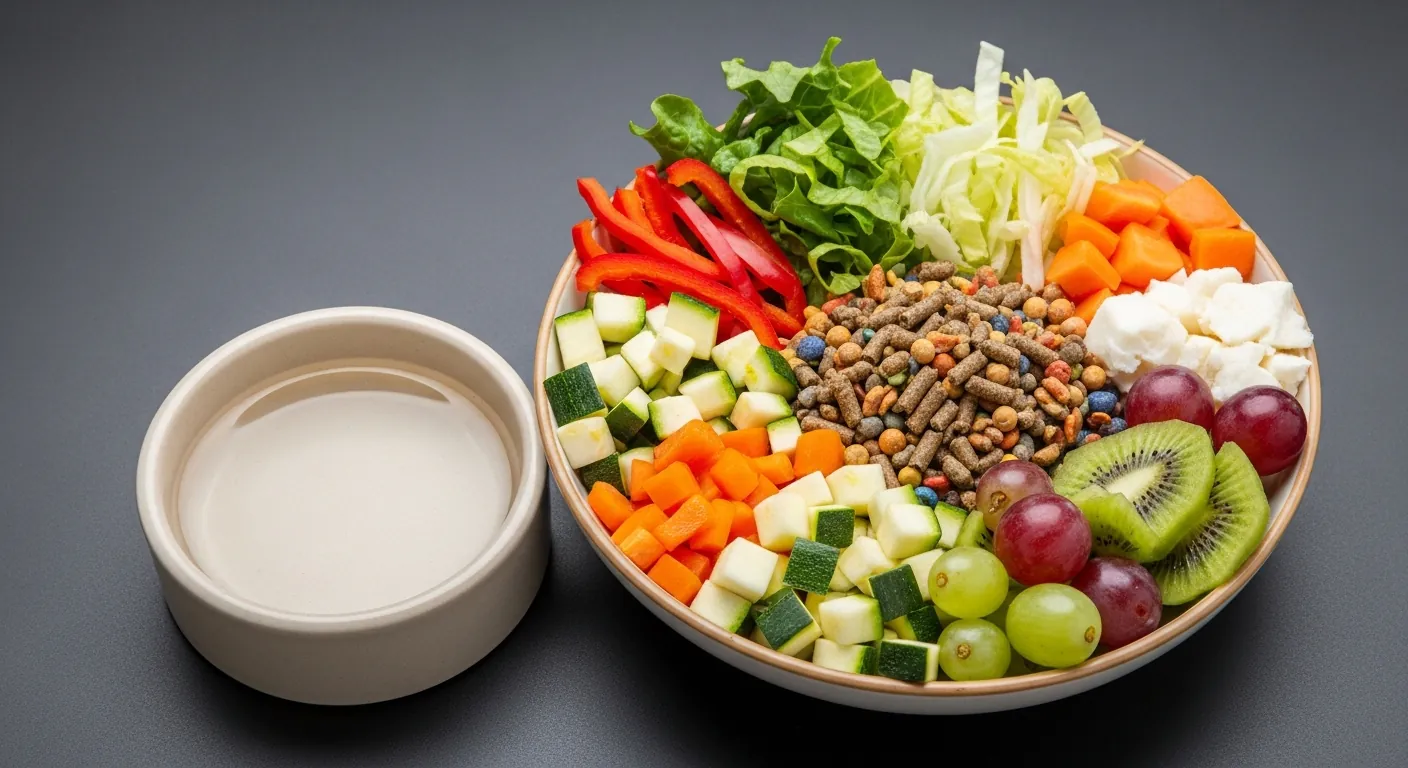
Foods to Avoid
Never feed your bird these potentially toxic foods:
- Avocado (extremely toxic to birds)
- Chocolate and caffeine
- Salt and high-sodium foods
- Garlic and onions
- Fruit pits and apple seeds
- Alcohol
- Sugary or processed foods
Creating the Perfect Living Environment
Cage Selection and Setup
The cage is your bird’s primary living space, so choosing the right one is crucial. The minimum cage size should allow your bird to spread its wings fully without touching the sides. For most medium-sized birds, this means a cage at least 24″ wide, 24″ deep, and 30″ tall, though larger is always better.
Essential Cage Features:
- Horizontal bars for climbing
- Stainless steel or powder-coated metal construction
- Multiple perches of varying diameters and textures
- Easy-to-clean food and water dishes
- Secure but easy-to-operate door latches
Optimal Cage Placement
Position your bird’s cage in a location that provides:
- Natural light without direct sunlight
- Protection from drafts and temperature fluctuations
- Social interaction opportunities with family members
- Quiet retreat areas for rest and security
- Easy access for daily care and interaction
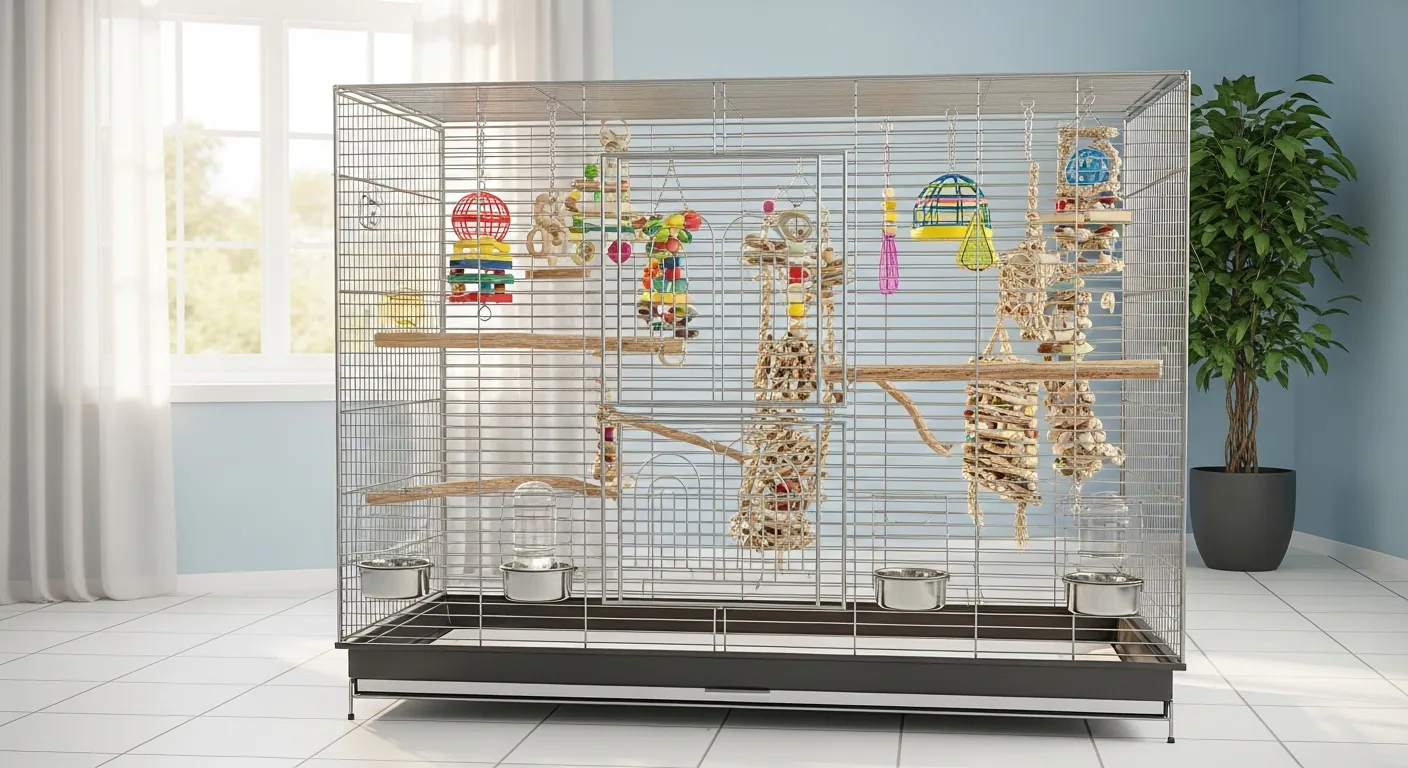
Environmental Enrichment
Mental stimulation is as important as physical health for birds. Provide:
- Foraging opportunities: Hide treats in paper cups or wrapped in paper
- Rotating toy selection: Introduce new toys regularly to prevent boredom
- Natural perches: Apple, willow, or manzanita branches of varying diameters
- Climbing structures: Rope toys and ladders for exercise
- Mirrors and bells: Use sparingly as some birds become obsessed
Health Monitoring and Preventive Care
Daily Health Checks
Daily observation and interaction are crucial for maintaining your bird’s health. Birds instinctively hide illness, so early detection requires vigilant monitoring.
Daily Health Indicators to Monitor:
- Appetite and eating habits: Changes in food consumption
- Droppings quality: Normal droppings have three components: feces, urates, and liquid
- Activity level: Lethargy or hyperactivity can indicate problems
- Breathing patterns: Labored breathing or tail bobbing are emergency signs
- Feather condition: Healthy feathers are smooth and well-preened
- Eye clarity: Bright, clear eyes indicate good health
- Posture and movement: Alert posture and smooth movements
Regular Veterinary Care
Establish a relationship with an avian veterinarian before you need one. Schedule annual check-ups and don’t hesitate to seek professional help if you notice any concerning changes in your bird’s behavior or appearance.
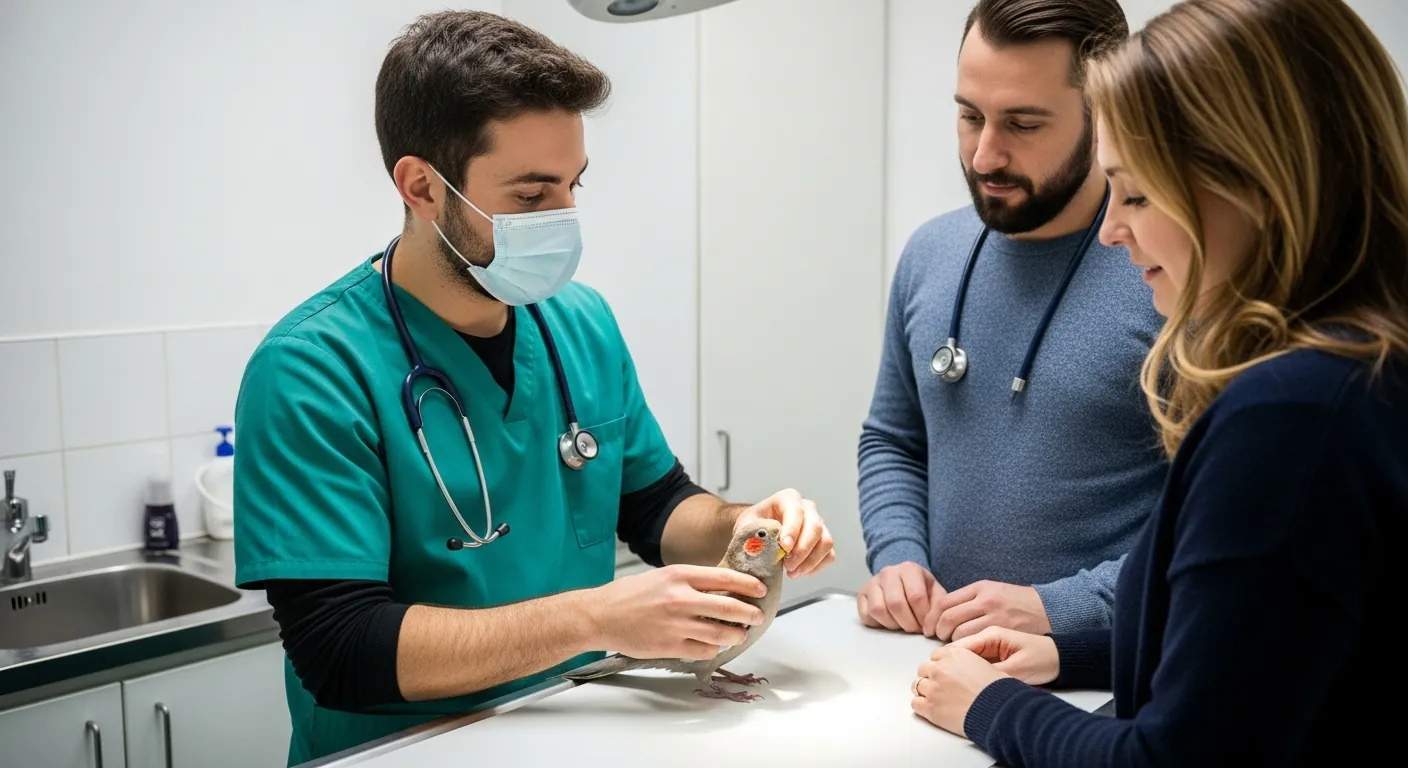
Common Health Issues to Watch For
- Respiratory problems: Sneezing, wheezing, or difficulty breathing
- Digestive issues: Changes in droppings, vomiting, or loss of appetite
- Feather plucking: Often indicates stress, boredom, or medical issues
- Bumblefoot: Swollen, infected feet from poor perch choices
- Egg binding: A serious condition in female birds
- Behavioral changes: Aggression, excessive vocalization, or withdrawal
Hygiene and Cleaning Protocols
Daily Cleaning Tasks
Daily cleaning tasks promote a thriving environment for your bird. These include:
- Fresh food and water daily
- Removal of uneaten perishable foods
- Spot cleaning of cage bottom
- Quick wipe-down of food and water dishes
Weekly Deep Cleaning
Weekly deep cleaning activities maintain proper hygiene:
- Complete cage disinfection with bird-safe cleaners
- Thorough washing of all dishes and toys
- Replacement of cage bottom liner
- Deep cleaning of perches and accessories
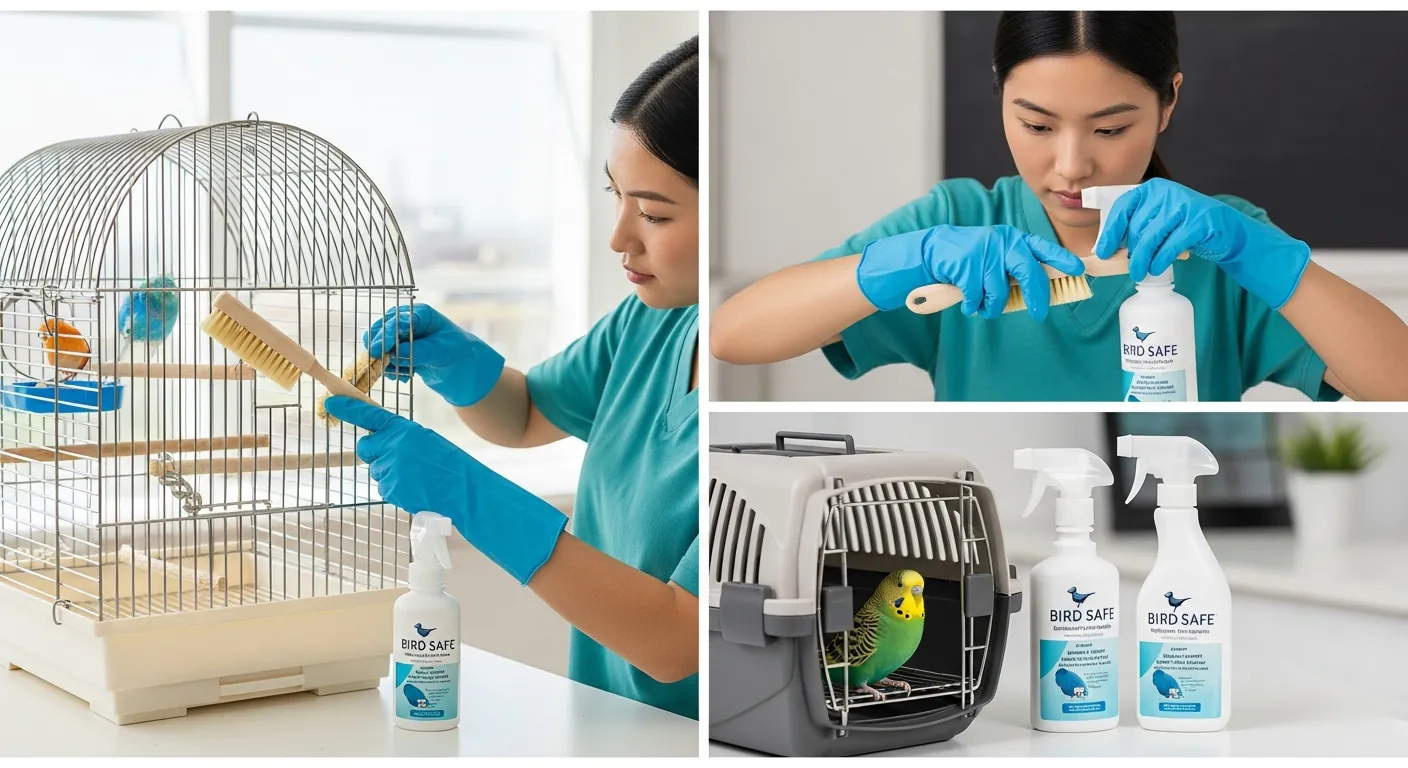
Monthly Maintenance
Monthly tasks such as cage inspection contribute to long-term well-being:
- Comprehensive cage inspection for wear and damage
- Replacement of worn toys and perches
- Deep cleaning of the cage area and surroundings
- Review and rotation of environmental enrichment items
Bathing and Grooming Essentials
The Importance of Bathing
All birds need to bathe, and most will bathe themselves vigorously if they have access to a shallow water bowl. Regular bathing helps maintain healthy feathers, removes dust and dander, and provides mental stimulation.
Bathing Options:
- Shallow water bowl: The most natural method for most birds
- Misting: Use a clean spray bottle with lukewarm water
- Shower perch: Allow your bird to join you in the shower
- Bird-specific bathing accessories: Commercial bird baths or fountains
Grooming Requirements
While birds are excellent self-groomers, they may need assistance with:
- Nail trimming: Monthly or as needed to prevent overgrowth
- Wing clipping: Controversial topic – consult your avian vet
- Beak maintenance: Usually unnecessary unless there are medical issues
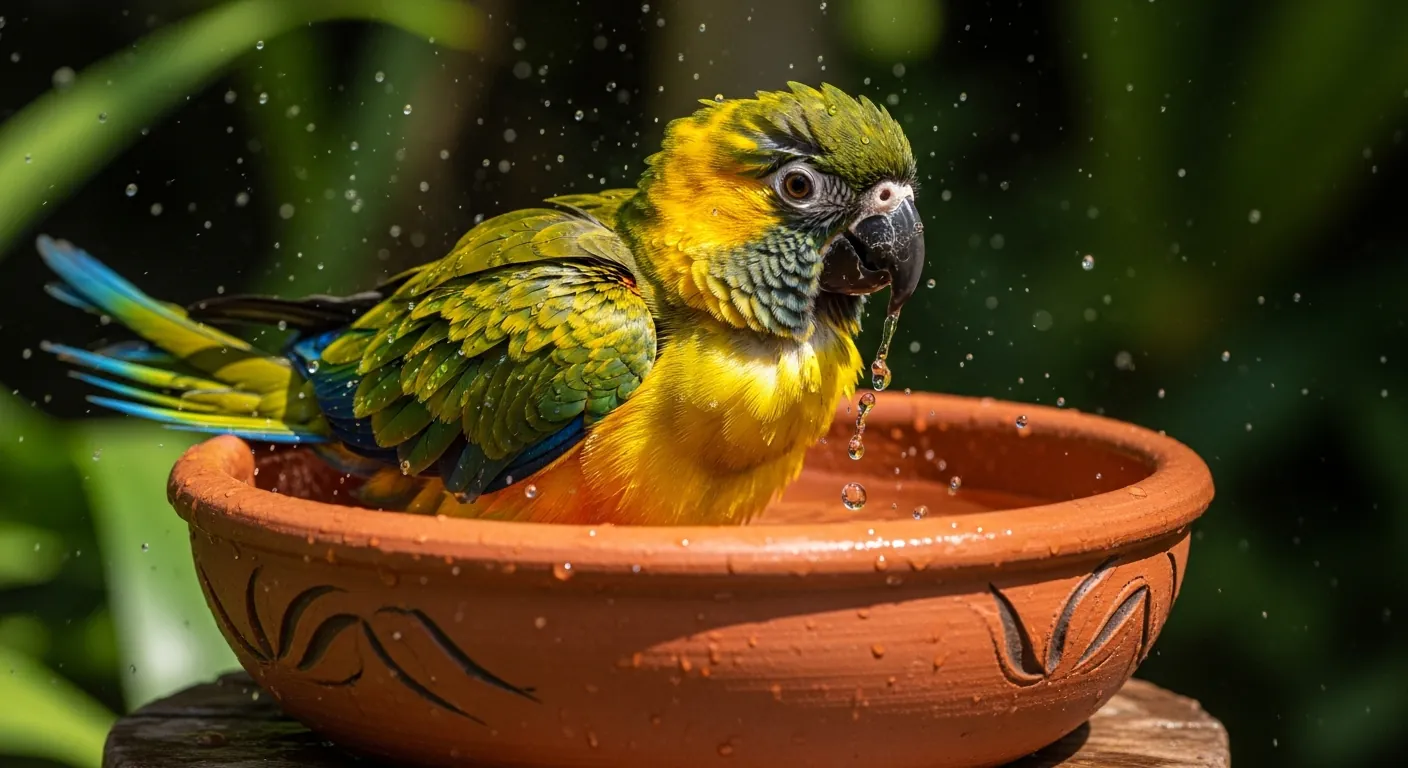
Social Needs and Behavioral Enrichment
Understanding Bird Psychology
Birds are flock animals that require social interaction for psychological well-being. In the wild, they spend their days foraging, socializing, and engaging in complex behaviors. Captive birds need similar stimulation to remain mentally healthy.
Building a Strong Bond
Effective Bonding Strategies:
- Consistent daily interaction: Spend quality time with your bird each day
- Positive reinforcement training: Use treats and praise to encourage desired behaviors
- Respect your bird’s boundaries: Allow them to approach you on their terms
- Establish routines: Birds thrive on predictability and structure
- Speak softly and move slowly: Build trust through gentle interactions
Preventing Behavioral Problems
Common behavioral issues often stem from boredom, lack of social interaction, or inadequate environmental enrichment. Prevent problems by:
- Providing adequate mental stimulation
- Maintaining consistent routines
- Ensuring proper sleep (10-12 hours of darkness)
- Addressing any signs of stress immediately
- Offering choices and control within their environment
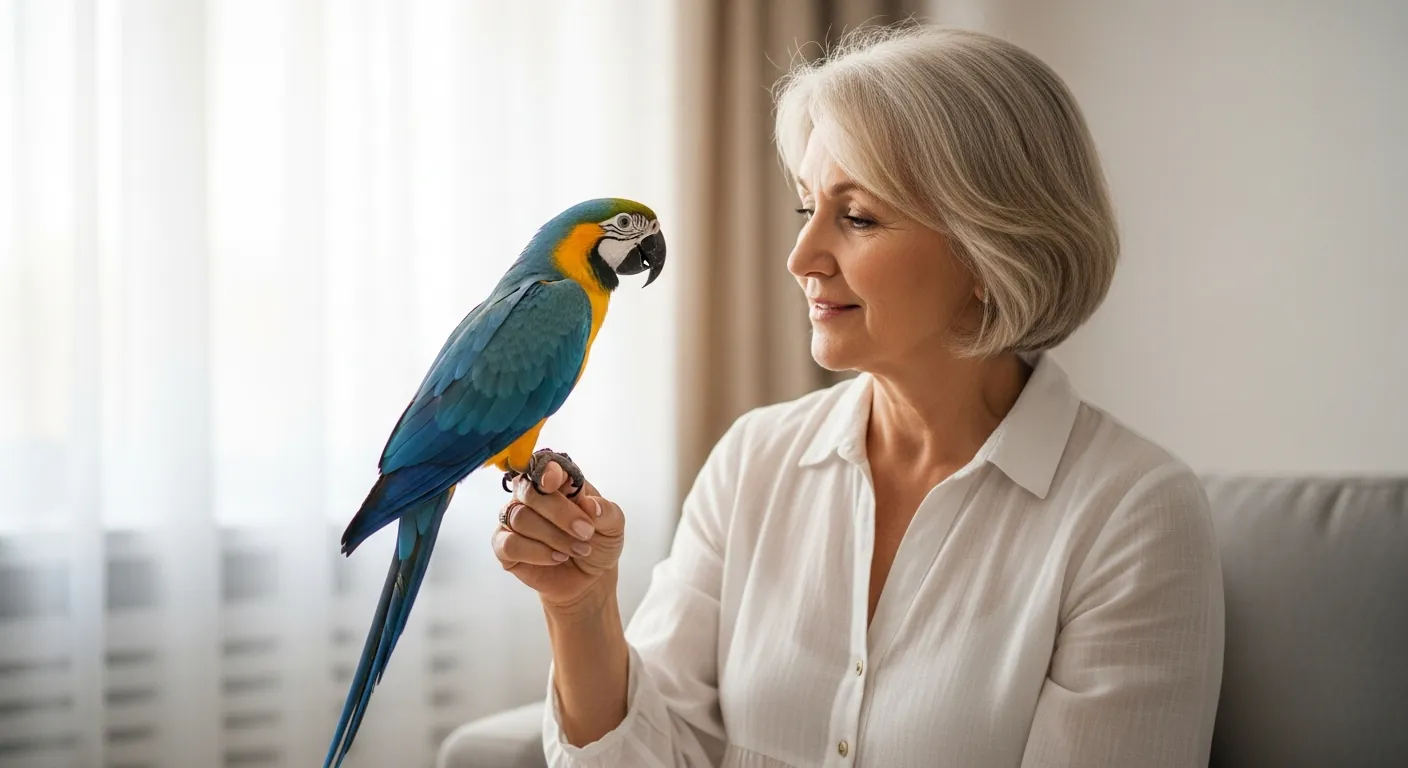
Species-Specific Care Considerations
Small Birds (Canaries, Finches, Budgerigars)
Small birds require high-quality seeds, fresh fruits, and vegetables while avoiding foods high in fat, sugar, or salt. They benefit from:
- Smaller cage bar spacing (½ inch maximum)
- Higher metabolism requiring more frequent feeding
- Social companionship (often do better in pairs)
- Careful temperature monitoring (more sensitive to cold)
Medium Birds (Cockatiels, Conures, Lovebirds)
Medium birds like lovebirds require 1.5-2 ounces of feed daily and benefit from a varied diet including small parrot mix with supplements. They need:
- Moderate cage bar spacing (½ to ¾ inch)
- Interactive toys and puzzles
- Regular out-of-cage time for exercise
- Consistent sleep schedule
Large Birds (Macaws, African Greys, Amazons)
Large birds require:
- Spacious cages with wider bar spacing (¾ to 1 inch)
- Substantial perches to support their weight
- Complex enrichment activities
- Extensive social interaction
- Specialized diets with larger food pieces
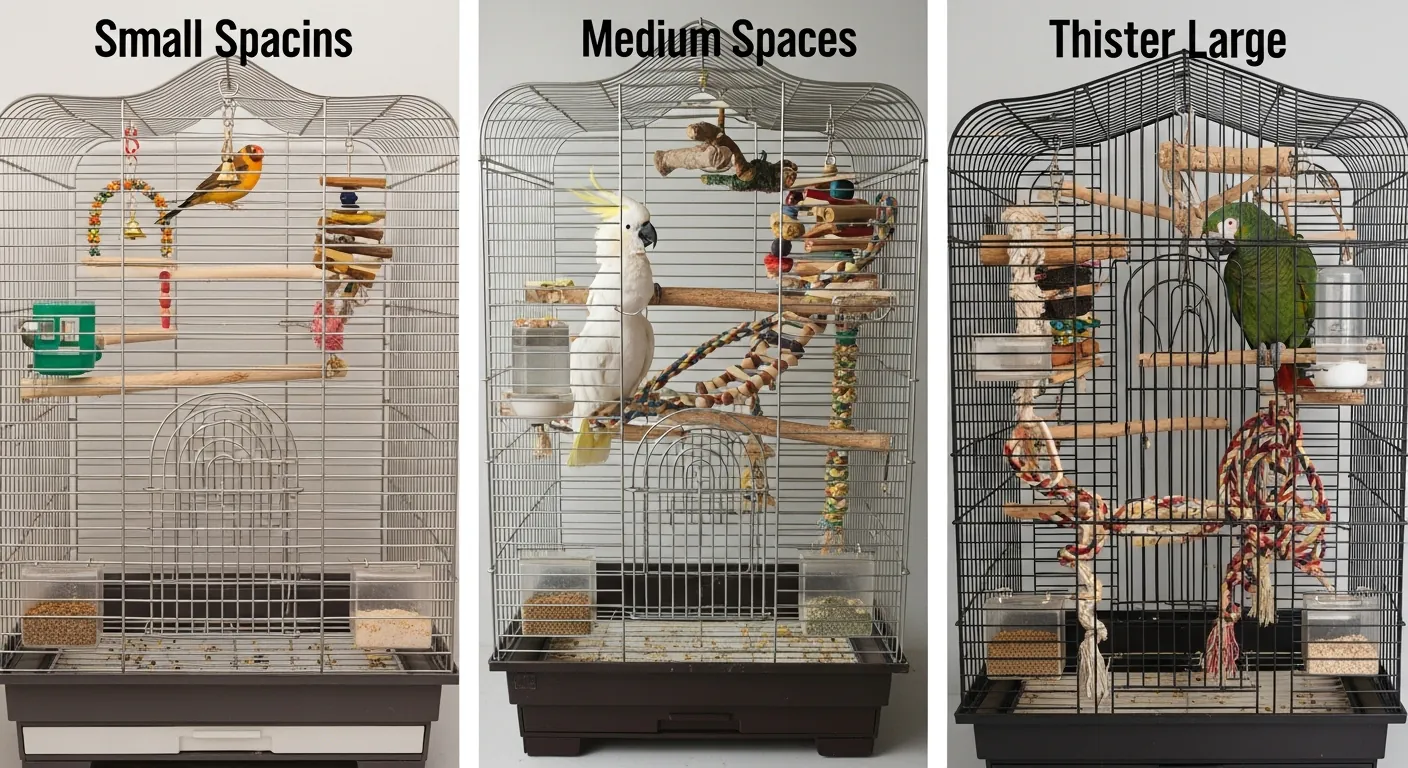
Emergency Preparedness and First Aid
Creating a Bird First Aid Kit
Every bird owner should maintain a well-stocked first aid kit containing:
- Styptic powder for bleeding nails
- Gauze and medical tape
- Saline solution for eye/wound cleaning
- Heating pad or heat lamp
- Small towels for restraint
- Emergency contact information for avian veterinarians
Recognizing Emergency Situations
Seek immediate veterinary attention if your bird exhibits:
- Difficulty breathing or open-mouth breathing
- Bleeding that doesn’t stop quickly
- Inability to perch or stand
- Seizures or loss of consciousness
- Severe lethargy or unresponsiveness
- Egg binding in female birds
- Exposure to toxic substances
Emergency Response Protocol
- Stay calm: Birds sense stress and may become more agitated
- Secure the bird: Use a towel to gently restrain if necessary
- Keep warm: Provide gentle heat if the bird appears cold
- Contact your veterinarian: Call ahead to prepare for your arrival
- Transport safely: Use a secure carrier lined with soft material
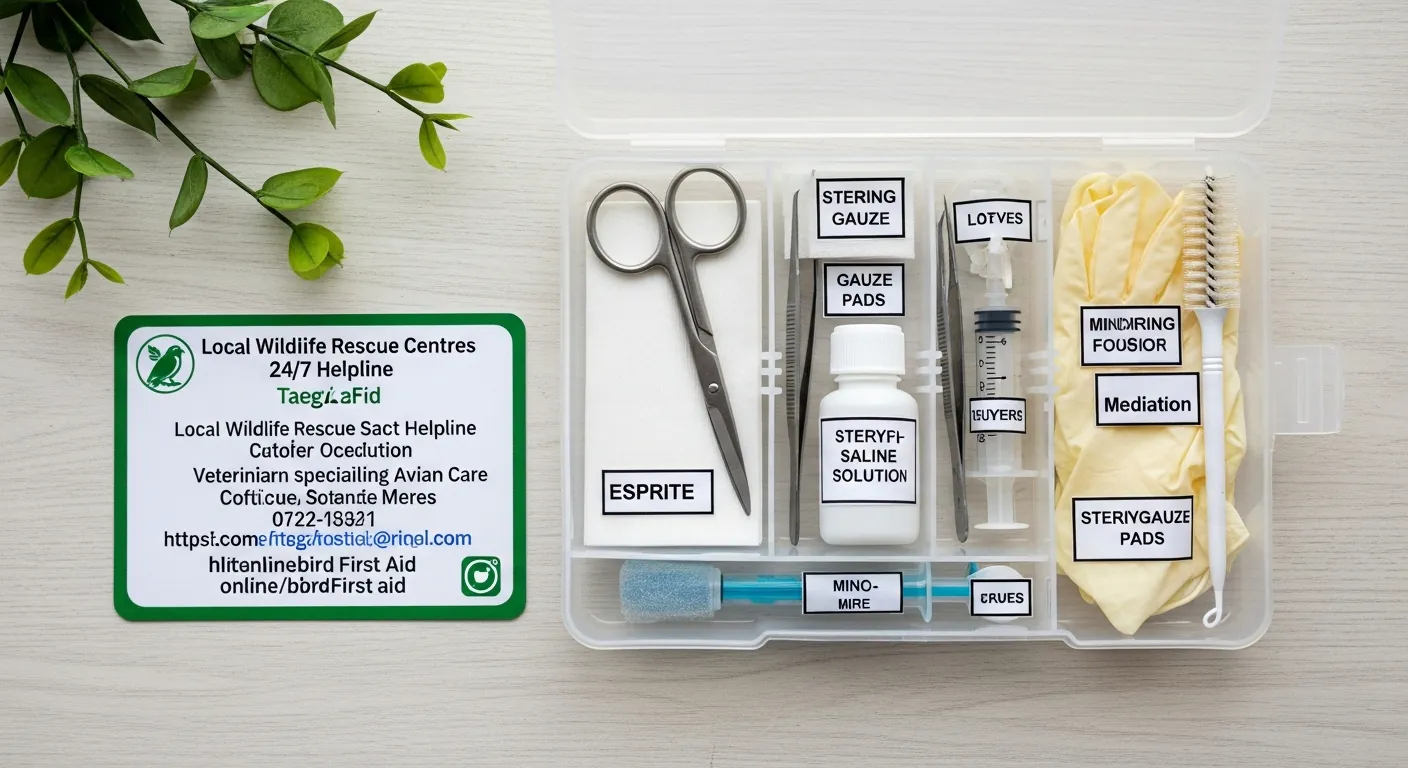
Seasonal Care Adjustments
Spring Care Considerations
Spring brings hormonal changes and increased activity:
- Monitor for nesting behaviors
- Increase calcium in diet for egg-laying females
- Provide extra enrichment for increased energy
- Schedule annual veterinary check-ups
Summer Care Tips
Hot weather requires special attention:
- Ensure adequate ventilation and cooling
- Provide multiple water sources
- Monitor for signs of overheating
- Protect from direct sunlight during peak hours
Fall and Winter Preparations
Colder months bring unique challenges:
- Increase indoor humidity levels
- Provide additional warmth if needed
- Adjust lighting to maintain natural rhythms
- Monitor for seasonal affective changes
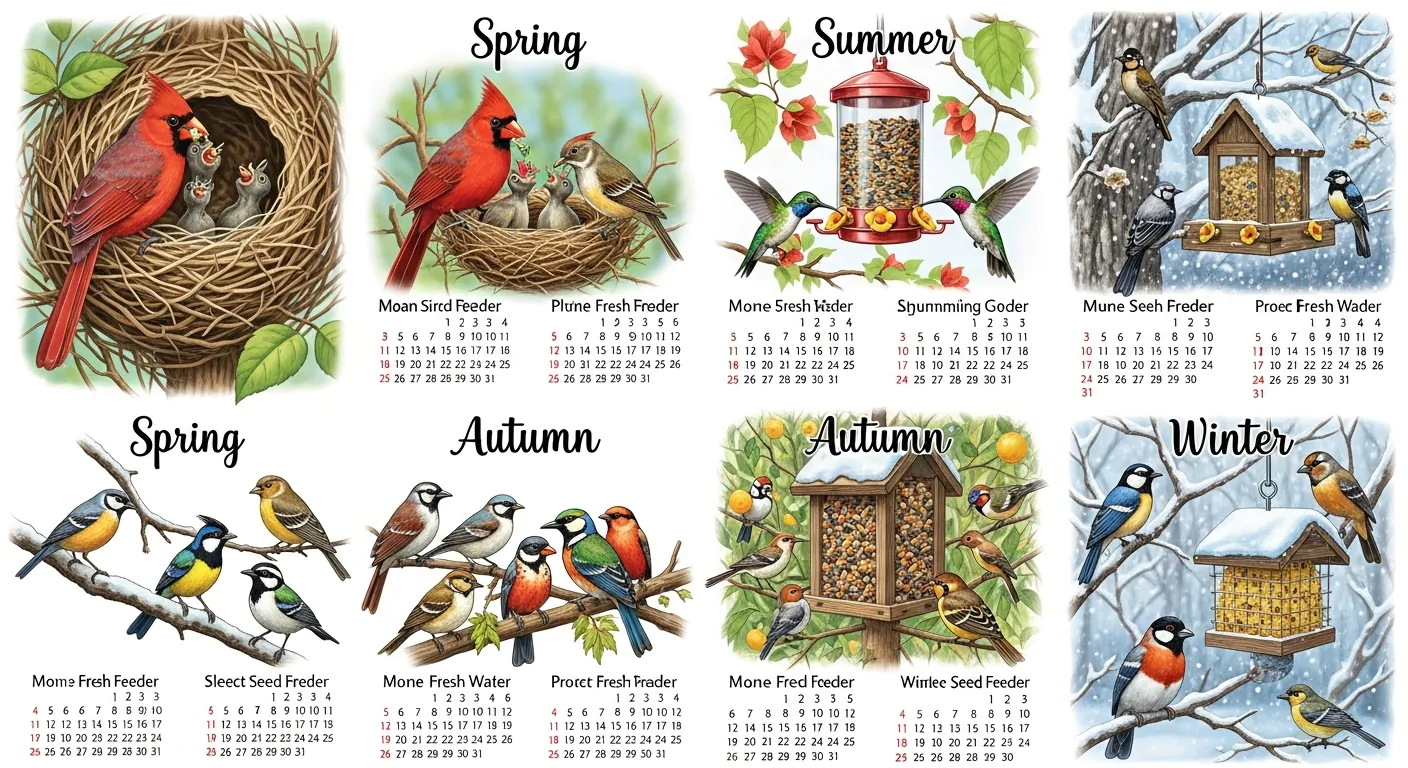
Technology and Modern Bird Care
Innovative Care Tools
Modern technology offers new ways to enhance bird care:
- Smart feeders: Automated feeding systems with portion control
- Camera monitoring: Keep an eye on your bird while away
- Environmental monitors: Track temperature and humidity
- UV lighting systems: Provide essential vitamin D synthesis
- Air purification: HEPA filters to maintain air quality
Mobile Apps and Resources
Utilize technology to track:
- Feeding schedules and food consumption
- Health symptoms and veterinary visits
- Behavioral observations and changes
- Environmental conditions and adjustments
Building a Support Network
Finding Qualified Professionals
Build relationships with:
- Avian veterinarians: Specialized medical care
- Avian behaviorists: Help with behavioral issues
- Reputable bird stores: Quality supplies and advice
- Professional bird sitters: Reliable care when traveling
Online Communities and Resources
Connect with other bird owners through:
- Species-specific forums and groups
- Social media communities
- Local bird clubs and societies
- Educational websites and resources

Conclusion: Your Journey to Exceptional Bird Care
Caring for birds is a rewarding journey that requires dedication, knowledge, and continuous learning. By following these comprehensive bird care tips, you’re providing your feathered friend with the foundation for a long, healthy, and happy life.
Remember that every bird is unique, and what works for one may not work for another. Stay observant, be patient, and don’t hesitate to seek professional advice when needed. Your commitment to excellent bird care will be rewarded with years of companionship, entertainment, and the joy that comes from knowing you’ve provided the best possible life for your avian friend.
The key to successful bird care lies in consistency, attention to detail, and a genuine understanding of your bird’s needs. As you implement these tips and develop your skills as a bird owner, you’ll discover that the bond between you and your feathered companion grows stronger each day.
Whether you’re caring for a single budgerigar or a flock of exotic parrots, these fundamental principles of bird care will serve you well. Stay informed about advances in avian care, maintain regular veterinary relationships, and never stop learning about these fascinating creatures that have chosen to share their lives with us.
Your dedication to proper bird care not only ensures your pet’s well-being but also contributes to the broader understanding and appreciation of these remarkable animals. By following these guidelines and staying committed to excellence in bird care, you’re setting the standard for responsible pet ownership and helping to ensure that future generations of birds will continue to thrive in human care.



